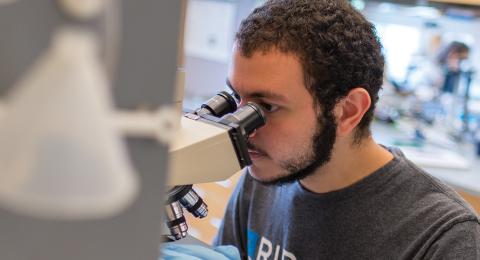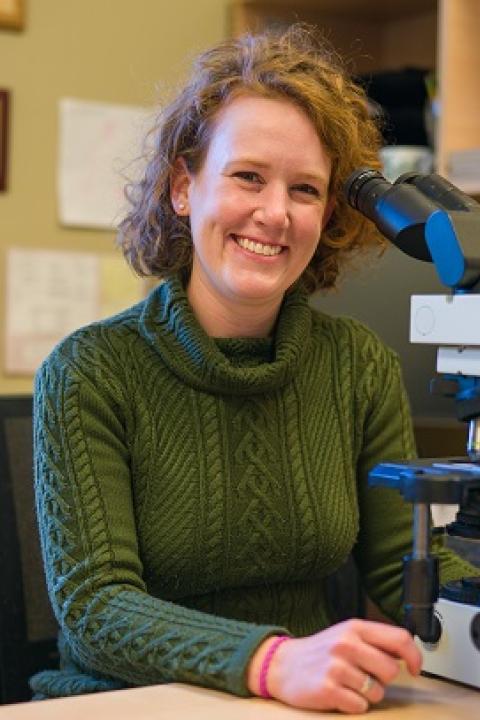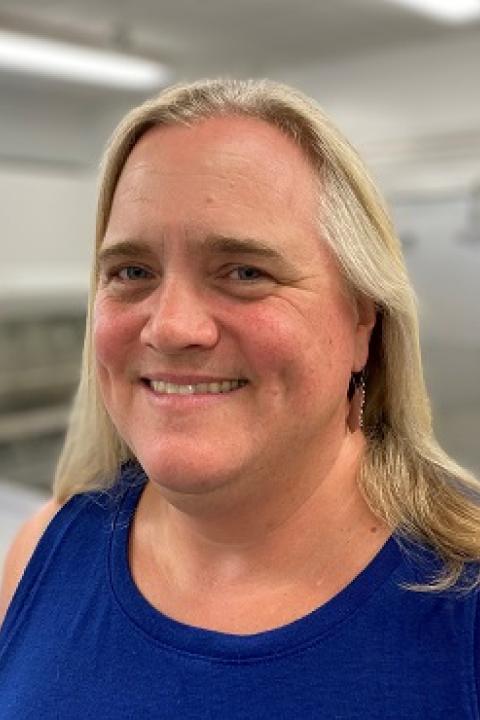Biomedical Sciences: Medical and Veterinary Sciences at UNH offers you a specialized education in the biological and physiological sciences crucial for careers in medicine and veterinary medicine. This program provides in-depth knowledge of human and animal health, disease mechanisms and diagnostics. With a strong emphasis on laboratory skills, clinical applications and research, students are well-prepared for advanced studies in human and animal health. This major is ideal for those passionate about improving health outcomes and pursuing careers in healthcare or veterinary fields.
What is medical and veterinary sciences?
The biomedical science: medical and veterinary sciences degree program is informed by the principles of the One Health Initiative, which unites human medicine, veterinary medicine and the environment. This rigorous academic program meets requirements for entry into veterinary school, medical school and graduate school in the area of biomedical science or for a career as a research scientist in either the biotechnology/pharmaceutical sector or government and academic research labs. Areas of study include general biomedical science, pathobiology and disease, and health and environmental issues.
Why study medical and veterinary sciences at UNH?
Students at UNH engage in hands-on learning through fieldwork, lab work and independent research supported by our state-of-the-art facilities. Our pre-professional health advising office and pre-vet advising program help students interested in pursuing medical and veterinary degrees make the right academic and extracurricular choices to prepare for the extremely competitive application process. Students interested in veterinary medicine also have the opportunity to work directly with veterinarians on campus at the NH Veterinary Diagnostic Laboratory, or to gain extensive experience with farm animals through coursework at UNH Agricultural Experiment Station facilities.
Potential Careers
- Clinical Pathologist
- College professor
- Dentist
- Forensic scientist
- Pharmacologist
- Physician
- Physician assistant
- Research scientist
- Veterinarian
Curriculum & Requirements
The Biomedical Science: Medical and Veterinary Sciences (BMS:MVS) program is informed by the principles of the One Health Initiative, which unites human and veterinary medicine. This rigorous academic program meets requirements for entry into veterinary school, medical school, and graduate school in the area of biomedical science or for a career as a research scientist in either the biotechnology/pharmaceutical sector or government and academic research labs.
You will select elective courses from three major areas of study:
- biomedical systems
- pathobiology and disease
- health and environmental issues
As a BMS:MVS major, you have many opportunities for career-relevant learning experiences including:
- NH Veterinary Diagnostic Laboratory located on the UNH campus
- UNH Agricultural Experiment Station farm facilities
- independent research in laboratories of UNH faculty in the biomedical and biological sciences
- experience in local hospitals
- internships in biotechnology and pharmaceutical companies in the Greater Boston area
BMS:MVS graduates are prepared for post-baccalaureate education in:
- professional health programs
- veterinary school
- medical school
- allied health programs (physician assistant or pathologist’s assistant)
- graduate programs
- biomedical science
- pathology
- public health
- nursing
Careers of previous Medical & Veterinary Sciences graduates include:
- research scientists/laboratory technicians
- biotechnology and pharmaceutical companies
- academic biomedical research programs
- forensic laboratories
- hospitals/health clinics
- state and federal government employment
- public health laboratories
- health inspector (e.g., Food and Drug Administration)
Sample Degree Plan
This sample degree plan serves as a general guide; students collaborate with their academic advisor to develop a personalized degree plan to meet their academic goals and program requirements.
| First Year | ||
|---|---|---|
| Fall | Credits | |
| MCBS 401 | Professional Perspectives in Molecular, Cellular, and Biomedical Sciences | 1 |
| BIOL 411 | Introductory Biology: Molecular and Cellular | 4 |
| CHEM 403 | General Chemistry I | 4 |
| ENGL 401 | First-Year Writing | 4 |
| Discovery Course | 4 | |
| Credits | 17 | |
| Spring | ||
| BIOL 412 | Introductory Biology: Evolution, Biodiversity and Ecology | 4 |
| CHEM 404 | General Chemistry II | 4 |
| MATH 424B | Calculus for Life Sciences | 4 |
| Discovery Course | 4 | |
| Credits | 16 | |
| Second Year | ||
| Fall | ||
| BMS 507 or ANSC 511 | Human Anatomy and Physiology I or Animal Anatomy and Physiology I | 4 |
| BMCB 605 | Principles of Cell Biology 1 | 4 |
| CHEM 651 & CHEM 653 | Organic Chemistry I and Organic Chemistry Laboratory | 5 |
| Discovery Course | 4 | |
| Credits | 17 | |
| Spring | ||
| BMS 508 or ANSC 512 | Human Anatomy and Physiology II or Animal Anatomy and Physiology II | 4 |
| CHEM 652 & CHEM 654 | Organic Chemistry II and Organic Chemistry Laboratory | 5 |
| BMS 503 & BMS 504 | General Microbiology and General Microbiology Laboratory 1 | 5 |
| Discovery Course | 4 | |
| Credits | 18 | |
| Third Year | ||
| Fall | ||
| BIOL 528 | Applied Biostatistics I | 4 |
| BMCB 658 & BMCB 659 | General Biochemistry and General Biochemistry Lab | 5 |
| PHYS 401 | Introduction to Physics I | 4 |
| GEN 604 | Principles of Genetics 1 | 4 |
| Credits | 17 | |
| Spring | ||
| PHYS 402 | Introduction to Physics II | 4 |
| Major Elective | 4 | |
| Major Elective | 4 | |
| Discovery Course | 4 | |
| Credits | 16 | |
| Fourth Year | ||
| Fall | ||
| Major Elective (Capstone) | 4 | |
| Major Elective | 4 | |
| Discovery Course | 4 | |
| Elective (any course) | 4 | |
| Credits | 16 | |
| Spring | ||
| Major Elective | 4 | |
| Major Elective | 4 | |
| Elective (any course) | 4 | |
| Credits | 12 | |
| Total Credits | 129 | |
- 1
BMCB 605, BMS 503 & BMS 504, and GEN 604 may be taken in other semesters, but all should be completed by the end of Fall semester in junior year.
Degree Requirements
All Major, Option and Elective Requirements as indicated.
*Major GPA requirements as indicated.
Major Requirements
Students in the Medical and Veterinary Sciences (MVS) option take eight Foundation courses, six Bioscience Core courses, three BMS-MVS Core courses, and six BMS-MVS Major Elective courses. One capstone experience, supervised and approved within the major, is required of all seniors. In addition, all other university academic requirements must be completed, including those for the Discovery Program and the University Writing Program requirements.
A grade of C-minus or above is required in all courses within the major, which includes Foundation, Bioscience Core, and BMS-MVS Core courses, and BMS-MVS Major Electives.
Students applying to health profession schools need a full year of English. ENGL 415C, ENGL 419, ENGL 501, ENGL 502 or ENGL 503 should be taken in addition to ENGL 401. For more information contact the Pre-Professional Health Program Advising Office.
| Code | Title | Credits |
|---|---|---|
| Foundation Courses | ||
| CHEM 403 | General Chemistry I 1 | 4 |
| CHEM 404 | General Chemistry II | 4 |
| CHEM 651 & CHEM 653 | Organic Chemistry I and Organic Chemistry Laboratory | 5 |
| CHEM 652 & CHEM 654 | Organic Chemistry II and Organic Chemistry Laboratory | 5 |
| MATH 424B | Calculus for Life Sciences 2 | 4 |
| BIOL 528 | Applied Biostatistics I | 4 |
| PHYS 401 | Introduction to Physics I | 4 |
| PHYS 402 | Introduction to Physics II | 4 |
- 1
CHEM 403 fulfills the Physical Science Discovery requirement
- 2
MATH 424B fulfills the Quantitative Reasoning Discovery requirement
| Code | Title | Credits |
|---|---|---|
| Bioscience Core Courses | ||
| BIOL 411 | Introductory Biology: Molecular and Cellular 3 | 4 |
| BIOL 412 | Introductory Biology: Evolution, Biodiversity and Ecology | 4 |
| BMS 503 & BMS 504 | General Microbiology and General Microbiology Laboratory | 5 |
| GEN 604 | Principles of Genetics | 4 |
| BMCB 605 | Principles of Cell Biology | 4 |
| BMCB 658 & BMCB 659 | General Biochemistry and General Biochemistry Lab | 5 |
- 3
BIOL 411 fulfills the Biological Science Discovery requirement, Discovery Laboratory requirement, and the Discovery Inquiry requirement.
| Code | Title | Credits |
|---|---|---|
| BMS-MVS Core Courses | ||
| BMS 507 | Human Anatomy and Physiology I | 4 |
| or ANSC 511 | Animal Anatomy and Physiology I | |
| MCBS 401 | Professional Perspectives in Molecular, Cellular, and Biomedical Sciences | 1 |
| BMS 508 | Human Anatomy and Physiology II | 4 |
| or ANSC 512 | Animal Anatomy and Physiology II | |
BMS-MVS Major Elective Courses
A total of six unique major elective courses are required. Two courses must be taken in each of the following subject areas: biomedical systems, pathobiology and disease, and health and environmental issues.
| Code | Title | Credits |
|---|---|---|
| Biomedical Systems Electives | ||
| Recommended Courses | ||
| BMS 702 | Endocrinology | 4 |
| BMS 718 | Mammalian Physiology | 4 |
| BMCB 760 | Pharmacology | 4 |
| GEN 717 | Molecular Microbiology | 5 |
| NUTR 750 | Nutritional Biochemistry | 4 |
| NUTR 751 | Nutritional Biochemistry of Micronutrients | 4 |
| Code | Title | Credits |
|---|---|---|
| Other Appropriate Courses | ||
| BMS 623 | Histology: Microscopic Cellular Structure and Function | 4 |
| BMS 740 | Human Microbiome | 4 |
| ANSC 603 | Introduction to Livestock Management | 4 |
| ANSC 605 | Poultry Production and Health Management | 4 |
| ANSC 609 | Principles of Animal Nutrition | 4 |
| ANSC 612 | Genetics of Animals | 4 |
| ANSC 698 | Cooperative for Real Education in Agricultural Management (CREAM) | 4 |
| ANSC 701 | Physiology of Reproduction | 4 |
| ANSC 710 | Dairy Nutrition | 4 |
| ANSC 715 | Physiology of Lactation | 4 |
| ANSC 724 | Reproductive Management and Artificial Insemination | 4 |
| BMCB 753 | Cell Culture | 5 |
| BMCB 754 | Molecular Biology Research Methods | 5 |
| BMCB 794 | Protein Structure and Function | 4 |
| CHBE 762 | Biomedical Engineering | 4 |
| GEN 704 | Microbial Genetics and Genomics | 5 |
| GEN 705 | Population Genetics 4 | 3 |
| GEN 706 | Human Genetics | 4 |
| GEN 711 | Genomics and Bioinformatics | 4 |
| GEN 713 | Microbial Ecology and Evolution | 4 |
| GEN 715 | Molecular Evolution | 4 |
| GEN 721 | Comparative Genomics | 4 |
| GEN 771 | Molecular Genetics | 4 |
| KIN 684 & KIN 685 | Emergency Medical Care: Emergency Medical Technician (EMT) and Emergency Medical Care: EMT Lab | 6 |
| ZOOL 613W | Animal Behavior | 5 |
| ZOOL 777W | Neuroethology | 4 |
- 4
Enrolling in GEN 725 concurrently is encouraged but not required
| Code | Title | Credits |
|---|---|---|
| Pathobiology and Disease Electives | ||
| Recommended Courses | ||
| BMS 602 | Pathogenic Microbiology | 3 |
| BMS 655 | Human and Animal Parasites | 3 |
| BMS 704 | Pathologic Basis of Disease | 4 |
| BMS 705 | Immunology | 3 |
| BMS 711 | 4 | |
| BMS 719 | Host-Microbe Interactions | 4 |
| BMCB 763 | Biochemistry of Cancer | 4 |
| Code | Title | Credits |
|---|---|---|
| Other Appropriate Courses | ||
| BMS 644 | Clinical Hematology | 3 |
| BMS 650 | Molecular Diagnostics | 4 |
| BMS 656 | Immunohematology | 3 |
| BMS 658 | Medical Biochemistry | 3 |
| BMS 703 | Infectious Disease and Health | 4 |
| BMS 706 | Virology | 3 |
| BMS 712 | Experiences in Applied Veterinary Diagnostics (4-credit minimum) | 2 |
| BMS 720 | Mycology, Parasitology, and Virology | 3 |
| BMS 735 | Molecular and Cellular Parasitology | 4 |
| ANSC 627 | Animal Health Applications | 4 |
| NUTR 773 | Clinical Nutrition | 4 |
| ANSC 625 | Animal Diseases | 4 |
| Code | Title | Credits |
|---|---|---|
| Health and Environmental Issues Electives | ||
| Recommended Courses | ||
| BMS 730 | Ethical Issues in Biomedical Science | 4 |
| ANSC 602 | Animal Rights and Societal Issues | 4 |
| ANSC 750 | Collaborative Farm Design and Development | 4 |
| ANSC 690 | Livestock and Wildlife in Namibia: Challenges, Opportunities and Geography | 4 |
| ANTH 610 | Medical Anthropology: Illness and Healing | 4 |
| BIOL 541W | Ecology | 0 or 4 |
| HMP 401 | United States Health Care Systems 5 | 4 |
| HMP 501 | Epidemiology and Community Medicine | 4 |
| NR 435 | Contemporary Conservation Issues and Environmental Awareness 5 | 4 |
| SOC 635W | Medical Sociology | 4 |
- 5
Only one 400-level course may be taken to fulfill a Major Elective requirement.
| Code | Title | Credits |
|---|---|---|
| Other Appropriate Courses | ||
| ANTH 685 | Gender, Sexuality and HIV/AIDS in Africa | 4 |
| BIOL 706 | Data Science with R for the Life Sciences | 4 |
| HMP 642 | Health Economics | 4 |
| HMP 669 | Human Behavior and the Public Health | 4 |
| NR 650 | Principles of Conservation Biology | 4 |
| PSYC 531 | Psychobiology | 4 |
| ANSC 670 | Exotic Companion Species Health and Management | 4 |
BMS: MVS Capstone
The capstone explores areas of interest based on the integration of prior learning. The capstone requirement may be satisfied through a course, created work or product, or some form of experiential learning (e.g., honors thesis, mentored research project, or other special student activity). Students may take more than one capstone course. Capstone completion is never displayed on Degree Works; your advisor will certify capstone completion at the time of graduation. Students must have 90 credits or more when completing their capstone requirement. See your advisor for questions about capstones.
| Code | Title | Credits |
|---|---|---|
| Approved BMS-MVS Capstone Courses | ||
| BMS 702 | Endocrinology | 4 |
| BMS 704 | Pathologic Basis of Disease | 4 |
| BMS 711 | 4 | |
| BMS 712 | Experiences in Applied Veterinary Diagnostics (4-credit minimum) | 2 |
| BMS 718 | Mammalian Physiology | 4 |
| BMS 719 | Host-Microbe Interactions | 4 |
| BMS 740 | Human Microbiome | 4 |
| BMS 795 | Investigations in Biomedical Science (4-credit minimum) | 1-8 |
| BMS 795W | Investigations in Biomedical Science (4-credit minimum) | 1-8 |
| BMS 799 | Senior Thesis (4-credit minimum) | 1-4 |
| BMS 799H | Senior Honors Thesis (4-credit minimum) | 1-4 |
| BMCB 760 | Pharmacology | 4 |
| BMCB 763 | Biochemistry of Cancer | 4 |
| ANSC 605 | Poultry Production and Health Management | 4 |
| ANSC 698 | Cooperative for Real Education in Agricultural Management (CREAM) | 4 |
| BMCB 753 | Cell Culture | 5 |
| INCO 790 | Advanced Research Experience (4-credit minimum) | 1-4 |
| NUTR 750 | Nutritional Biochemistry | 4 |
| Other 795 Investigations course in the biological sciences (4-credit minimum) | ||
For a Capstone experience not listed above, such as an internship, submit a Capstone Experience Approval form prior to beginning the experience.
Program Learning Outcomes
Core Knowledge
- Students will demonstrate an understanding of core knowledge in biochemistry, molecular biology, cell biology, genetics & biomedical sciences.
Quantitative Literacy, Inquiry & Analysis
- Students will be able to apply the scientific method to examine experimental evidence and draw informed conclusions.
- Students will be able to use graphs to represent scientific data.
- Students will be able to apply statistical methods to interpret scientific data.
Critical Thinking & Problem Solving
- Students will be able to use data to troubleshoot an unexpected outcome.
- Students will be able to apply core knowledge to critically interpret scientific data.
Written Communication
- Students will demonstrate written skills to communicate scientific knowledge and experimental data.
Oral Communication
- Students will be able to demonstrate oral presentation skills to communicate scientific knowledge and experimental data.
Biomedical Science: Medical and Veterinary Sciences option
- Students will be able to list the major organ systems in mammals and describe their basic structure and function.
- Students will be able to describe the differences between Gram-negative and Gram-positive bacteria.
- Students will be able to describe the structure and function of the major cellular organelles.
- Students will understand the principles of Mendelian genetics.
- Students will understand the pathogenesis of disease and effects on the major organ systems.
- Students will be able to describe the inter-relationships between health and disease, society, and the environment.
Explore Program Details
What is your acceptance rate for students applying to medical school?
-
The acceptance rate for medical students over the past five years is 56%.
- The acceptance rate for dental students over the past five years is 75%.
What is the average GPA and MCAT score of students accepted to medical school from your program?
-
The average GPA of students accepted to medical school over the past five years is 3.78.
- The average MCAT score for students accepted to medical school over the past five years is 63%.
What is your acceptance rate for students applying to veterinary school?
-
The acceptance rate for veterinary students in the 2018-2019 application cycle was 91%.
What is the average GPA of students accepted to veterinary school from your program?
-
The average GPA of students accepted to veterinary school in 2018-2019 was 3.57.
What other career options are there for students in the major who may not be accepted to medical or veterinary school, or who may not be interested in that career path?
-
Research scientist
- Physician assistant
- Accelerated nursing programs
- Public health
- Graduate school in a wide variety of programs
- Biotechnology
- Dental school
- Chiropractic school
- Pharmacy school
- Naturopathic medicine
- Medical assistant
- Veterinary assistant
What kinds of experiences exist in UNH’s Biomedical Science (BMS): Medical and Veterinary Sciences (MVS) program that make it different from other programs preparing students for professional schools?
-
New Hampshire Veterinary Diagnostic Laboratory
- Hamel Center for Undergraduate Research (wide variety of research programs during the semester and the summer; research at domestic and international sites)
- A pre-health professions advisor in the College of Life Sciences and Agriculture (COLSA)
- A career planning office house in COLSA, where resume-writing assistance/workshops are offered and where funds are available to partially support unpaid internships
- A rigorous curriculum that includes all requirements for admissions to medical school, veterinary school, dental school and physician assistant programs, with a wide variety of major electives (e.g., courses in Preceptorial in Prehospital Care; Experiences in Applied Veterinary Diagnostics; Emergency Medical Care: Emergency Medical Technician and many other cool classes)
- The McGregor Emergency Medical Service is located on the Durham campus, and they welcome student volunteers.
- Internships at Health and Wellness (on-campus)
Where have your students been accepted to medical or veterinary school?
-
Albany
- Boston University
- Drexel
- Dartmouth College
- George Washington University
- Quinnipiac
- Tufts
- Tulane
- University of Connecticut
- University of Massachusetts
- University of New England
- University of Vermont
- Wake Forest
- and many others
I am interested in physician assistant programs. Is the Biomedical Science: Medical and Veterinary Sciences (BMS: MVS) program for me?
Yes, by completing the BMS: MVS program, you will meet all requirements for applying to physician programs. The rigorous course work in the program will give you an excellent scientific foundation, preparing you well for a variety of pre-health professions, should you decide not to pursue physician assistant programs.
Besides classes, what are some extracurricular activities for me?
-
Pre-Vet club
- Global brigades (public health outreach to under-served communities in Nicaragua and Ghana, for example)
- Over 200 recognized student organizations
As part of the University of New Hampshire’s Discovery Program requirements, all students must complete a Capstone experience.
Take a deeper look at what it means to be a pre-veterinary student at UNH and discover why UNH students have an average 92% acceptance rate to veterinary schools — nearly double the national rate.
During our one-hour on-campus information sessions, faculty members will provide you with an overview of the pre-veterinary program from exceptional experiential learning to expert pre-veterinary advising, discuss majors and curriculum and answer any questions you might have. You will also have an opportunity to talk with current students about their experiences. Find out why UNH should be the top choice for all students considering a career in veterinary medicine — register to attend an on-campus info session today.
The sessions and tours are held throughout the year.
Advising is available for UNH students, alumni, and post baccalaureates pursuing health professional careers.
The Pre-Health Advising Office provides support throughout the process of preparing for health professions school from advising on the courses they should take to helping navigate through the complex steps of the application process.
Register with Pre-Professional Health Office
Students interested in the Biomedical Sciences: Medical and Veterinary Sciences major may also be interested in the following advanced degrees at UNH. Students in the program also have the opportunity to participate in the UNH accelerated master’s program.
Molecular and Cellular Biotechnology M.S.
Molecular and Evolutionary Systems Biology Ph.D.
Biotechnology: Industrial and Biomedical Sciences, Manchester M.S.



















